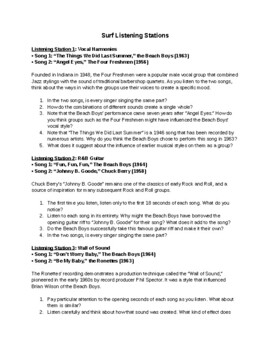1960s Song Analysis Listening Centers - Surf Sounds feat. The Beach Boys
- Word Document File
Also included in
- How does ZERO planning sound? Lessons and resources for an entire year of 8th grade English placed in your hands? Included in this bundle is ABSOLUTELY EVERYTHING that you'll need to make it from August to June! The resources provided can be used in any order that you prefer - follow the pacing guidPrice $392.72Original Price $701.28Save $308.56
- The materials in this bundle could easily be Units for a new HISTORY centered elective at your school. This program relies heavily on the music of the time period to take students on an eccentric tour through World History. I strongly believe that MUSIC is the most powerful tool that we have to engaPrice $111.64Original Price $159.48Save $47.84
- After WWII, the country’s landscape was changing, in ways that would have a major impact on American life and culture, and, certainly, on the worlds of young people. To begin this lesson, students will analyze the rise of the suburbs, and the ways in which the Beach Boys made music that evoked thisPrice $17.38Original Price $21.73Save $4.35
Description
This Station Rotation Activity is meant to be paired with and part of a larger unit slideshow called The Suburbanization of Postwar America. Students will use this worksheet to rotate through 4 listening stations (the media is provided in the slideshow as embedded video clips).
At Station 1 - students will focus on Vocal Harmonies and listen to two songs - Song 1: “The Things We Did Last Summer,” by the Beach Boys (1963) and Song 2: “Angel Eyes,” by The Four Freshmen (1956). Ask students to think about the ways in which the groups use their voices to create a specific mood. Students will discuss and answer 5 questions before rotating to the next station.
At Station 2 - students will focus on R&B Guitar and listen to two songs - Song 1: “Fun, Fun, Fun,” by The Beach Boys (1964) and Song 2: “Johnny B. Goode,” by Chuck Berry (1958). Ask students to notice the guitar riff that was "borrowed" from Chuck Berry as they discuss and answer 4 questions before rotating to the next station.
At Station 3 - students will focus on what was called the Wall of Sound. Students will again listen to two songs - Song 1: “Don’t Worry Baby,” by The Beach Boys (1964) and Song 2: “Be My Baby,” by the Ronettes (1963). Ask students to think about the type of sound created in these songs, how the sounds were created, and what effect their sounds have on the mood of each song as they discuss and answer 3 questions before rotating to the final station.
At Station 4 - students will focus on Instrumental Reverb by listening to two more songs - Song 1: “Wipeout,” by the Surfaris (1963) and Song 2: ”Miserlou,” by Dick Dale and the Del-Tones (1962). Ask students to think about the type of sound reverb creates and what effect reverb has on a song's mood.






